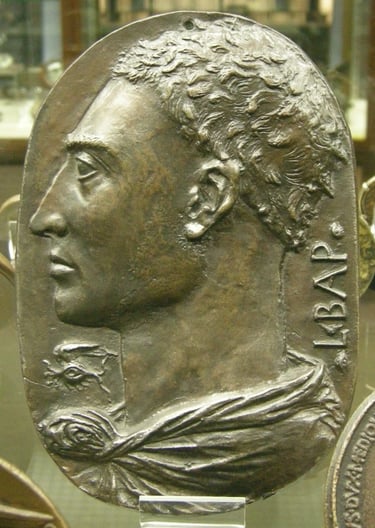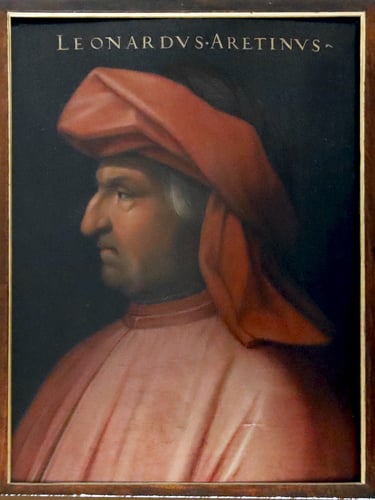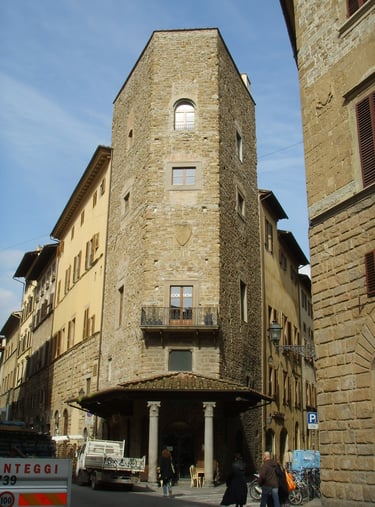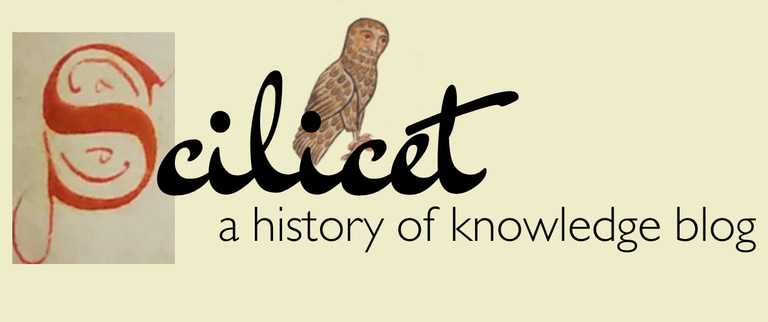One of the main reasons to have books, some would argue, is to learn from them. Books, especially before the age of mass printing, were special and costly objects and lots of care and labour went into their production. It was all worth it, though, because books were considered useful. But were they the best ways to acquire knowledge?
This was an ongoing discussion during the fifteenth century, when what became known as humanism was turbocharging the Renaissance in Florence. The main focus of this intellectual movement was rediscovering texts of Greco-Roman antiquity (that is, your Plato and Cicero and the like) in order to reinvigorate their own culture.
The main vehicle to achieve this goal was through self-improvement by focusing on the studia humanitatis, a set of disciplines which included grammar, rhetoric, poetry, history, and moral philosophy. Why these things? Because they provided opportunities to learn from the deeds of great men (historical and fictional, and yes, it was mainly men) and made one a good orator which was important for public life. So, overall, their attitude was rather bookish.
On the other hand, it was still more or less the heyday of craft guilds, and if you wanted to get into most professions, you wouldn’t get a degree or read books but do an apprenticeship with a master.
Keeping up with the Albertis
One brilliant humanist writer who is lesser known by non-specialists even though almost everything he did was fascinating was Leon Battista Alberti. Known for his work as an architect and theorist of painting, sculpture and architecture, Alberti was the original Renaissance man. He also wrote plays, short stories and treatises, one of which is of particular interest to us.


Leon Battista Alberti, (possibly) Self-Portrait, c. 1435
Written in the 1430s in the Tuscan dialect, Alberti’s treatise in four books On the Family (I libri della famiglia) was a fictional dialogue between members of the Alberti family who assembled at the family house in Padova (they were exiles from Florence but that’s a long story) to visit the deathbed of a sick and elderly relative.
As the family sat together a systematic discussion of the best way to run a household (and other adjacent subjects) ensued. The two main collocutors in the third book were the young and bookish Lionardo (who, it was suggested, Alberti modelled after Leonardo Bruni – one of the most important humanistic scholars of the time and the chancellor of Florence), and the old, distinguished, and slightly grumpy Giannozzo degli Alberti.


Leonardo Bruni, the ultimate bookish humanist, portrait by Cristofano dell'Altissimo.
Uncle Giannozzo kindly agreed to teach the younger inexperienced Albertis about thriftiness (or masserizia). This meant, namely, to spend money only when it’s really required and not too much or too little. But don’t hoard your money either, there’s nothing good about being a miser.
Giannozzo’s approach to other people, as he explained it, was sceptical in nature so he was also advising the youngsters to be careful about lending money (even to friends) and to steer well clear of public life. The young and curious Lionardo was predictably very grateful for the opportunity to learn from Giannozzo and kept encouraging him to say more.
Put down that book
Even though Italians of that time were by and large conditioned to respect their elders, there is something a bit odd about this dynamic. Particularly, that Giannozzo’s sage advice was diametrically opposed to what most humanists were advocating (that is, an optimistic view on the capacity of people to be virtuous, and a deep involvement in public life).
While this tension was for the most part implicit, Giannozzo’s hostility towards the humanistic programme was clear when it came to the subject of education vs experience. This following exchange sets up things nicely:
Giannozzo – You know, Lionardo, I am not an educated man. I have tried all my life to know things by experience, and not to count much on what others have said. I know what I know more from the actual truth of it than from anyone persuading me. [...] I like a reason which amounts to a clear demonstration rather than an argument which forces me to admit a point…
Lionardo – Oh, Giannozzo, how much more help in the things of this world is a man of your wisdom and experience than a scholar without experience.
Giannozzo – What do you mean? Don't you have these things in your books? Yet they say you can find anything in books.
Lionardo – That may be, but I don't remember having seen it anywhere…
What we have here is Giannozzo expressing his scepticism – if not disdain – to book learning and to the sort of reasoning which is not clearly straightforward. Lionardo, who is clearly being criticised here with his sophistry and precious books, just conceded his position without putting up much of a fight.
Later in the dialogue, Giannozzo was not holding back his punches either:
Giannozzo – We who are not schooled in books become erudite through practice and time. [...] We undoubtedly know, by virtue of experience, more than you with all your learning and subtleties and wily schemes.
And later, we get another anti-intellectual gem from him:
Giannozzo – I have always been satisfied to learn no more than I needed to know; it suffices me to understand the things I see and feel in my hands. You educated people want to know what happened a hundred years ago and what will happen sixty years from now.
The obvious hostility towards scholarship, the clear preference of knowledge gained from experience along with the fact that bookish Lionardo defers to his uncle seem quite conclusive: experience is better than learning. Or is it?


The Alberti family home in Florence
Subverting the narrative
One reason why historians love Alberti is that his works are full of multiple layers of irony and subversive narratives. First of all, this discussion about books being useless is contained within what is essentially (also) a handbook written by a learned humanist. Furthermore, Giannozzo, who admitted several times that he was uneducated, apologetically stated at one point that:
Giannozzo – I lacked the knowledge and the skill to adorn my thoughts with eloquence, to organise well, to weave in examples and cite authorities and use fine words; for, as you know, I am illiterate [i.e., ignorant of Latin].
This sounds rather self-deprecating but could also be read as sarcasm. After all, he was quite adamant that this sort of knowledge does not matter much and it’s better to have life experience instead, so why should this matter?
In another bit of the dialogue, we also see a role reversal between Lionardo and Giannozzo:
Lionardo – What do you suppose, Giannozzo, since as you said those ancient writers were only men like yourself?
Giannozzo – Yes, but more learned ones. And if it were not so, their works would not have lived through so many ages.
Giannozzo was making a good point there. Knowledge is preserved in books because it is useful, and books survived from antiquity, not by mistake, but because people made deliberate choices to preserve them. This must mean that the wisdom they contain is still worthy of attention.
The amount of original written material that we have from ancient Greece and Rome is minuscule and fragmentary (some inscriptions, some papyri). And what was not copied and copied again by scribes, scholars, and monks on more durable parchment had mostly disintegrated and was lost. What survived was passed down to us because it was important enough to maintain. And a special thanks goes to learned Greeks, Arabs, and monastics in the Latin West who kept these texts alive throughout the Middle Ages so that early modern people could ‘revive’ them.
The humanistic project was particularly concerned with recovering knowledge from classical antiquity, which they considered a golden age. This knowledge and these old books were particularly prized by humanists who also tried to imitate the style of the ancients (Alberti himself was so good at this that some were fooled to think that his comedy Philodoxeos was of ancient origin).
In historical terms, though, we can certainly say that learning from books has not gone anywhere. And with the aid of print and rising literacy, instructing manuals (known to some as how-to books) became so ubiquitous that it is probably best that Giannozzo did not live to see it.
Sources:
The translation used here of Alberti’s Della famiglia is taken with minor alterations from:
Leon Battista Alberti, The Family in Renaissance Florence: Book Three, translated by Renee Neu Watkins (1994).
Hanan Yoran, "Glory, Passions and Money in Alberti’s Della famiglia: A Humanist Reflects on the Foundations of Society." The European Legacy, 20 (2015), pp. 527-542.
